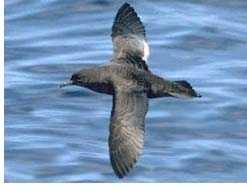Mark Carey of the Department of Environmental Management and Ecology, La Trobe University, Wodonga, Australia has studied the levels of ingested plastic in fledgling Short-tailed Shearwaters Puffinus tenuirostris, a potential candidate species for listing within ACAP. His findings have been published in the journal Emu Austral Ecology.
The paper's abstract follows:
"Pollution of the world's oceans affects a wide variety of marine organisms and thus raises major concerns regarding conservation. Ingestion of plastic debris has increased since the 1970s, particularly among the Procellariiformes, resulting in a range of lethal and sub-lethal side effects. Plastic loads of adult Short-tailed Shearwaters (Ardenna tenuirostris) are well known from research in the northern hemisphere, but the amount in offspring has yet to be quantified. In this study, the stomach contents of fledgling Short-tailed Shearwaters on Phillip Island, Victoria, were analysed for plastic particles. All birds sampled contained plastic material, averaging 7.6 particles per bird. The mean mass of plastic per bird was 113 mg. The most common type of plastic found was user plastic, followed by industrial pellets. The birds contained a small proportion of other refuse such as polystyrene and plastic bag. Plastics were primarily light in colour, though red and grey-black materials were also recorded. Despite a weak trend, no clear influence of ingested plastic on body condition could be demonstrated, although there was some evidence of physical damage to the gizzard. Accumulation of plastic objects in the digestive tract over time may indirectly affect the life cycle of species and their reproductive success, with long-term harm caused to populations. Data suggest that the impact of this type of pollution on seabird welfare is urgently required."
Reference:
Carey, M.J. 2011. Intergenerational transfer of plastic debris by Short-tailed Shearwaters (Ardenna tenuirostris). Emu 111: 229-234.

John Cooper, ACAP Information Officer, 24 June 2011, updated 24 August 2011

 English
English  Français
Français  Español
Español